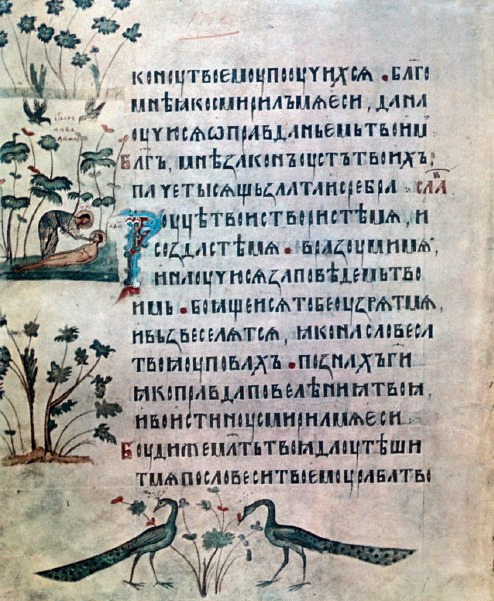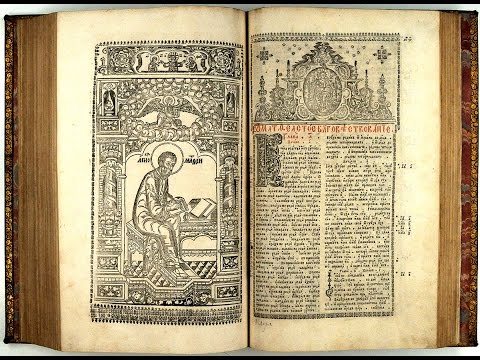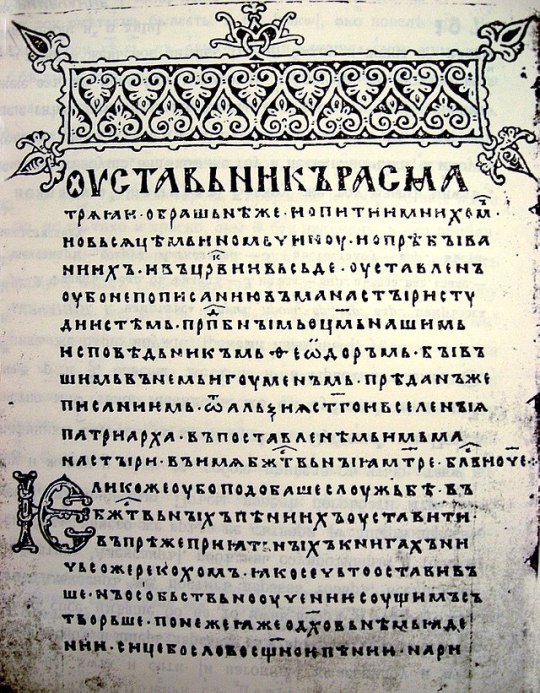#churchslavonic
Photo

A Psalter from Kiev, written in Old Church Slavonic. I love seeing the script of this language, even if I understand very little. I have updated my Tumblr blog in light of my current interests.
#churchslavonic#kiev#psalms#psalter#oldchurchslavonic#slaviclanguages#russophile#ukraine#russian#languages#langblr#books#theology
53 notes
·
View notes
Photo

A beautifully illuminated and illustrated Bible in Old Church Slavonic.
#churchslavonic#oldchurchslavonic#slavonic#russian#slaviclanguage#slavic#russophile#kievan rus#langblr
18 notes
·
View notes
Photo

Another Psalter written in Church Slavonic, a Slavic language of the Southern Slavic language family. Today, this is used largely as a liturgical language, although at least 2 centuries ago, words from the language were commonly used alongside others, most notably, Russian.
#churchslavonic#russian#psalter#psalms#slaviclanguages#slavic#russophile#slaviclanguage#easterneurope#russia#cyrillicscript#glagolitic#linguist#languages#oldlanguages#langblr
4 notes
·
View notes
Photo

Another beautiful manuscript of Old Church Slavonic.
At the moment, picking up words from Church Slavonic has helped me to recognise some words in modern Russian. Has anyone else seen the same benefit?
#oldchurchslavonic#churchslavonic#russophile#manuscript#calligraphy#slaviclanguages#slavicstudies#modernrussian#russianlanguage#russianorthodoxchurch#langblr
2 notes
·
View notes
Video
youtube
Dmitri Bortnyansky’s Tibie Paiom, sung by the Ensemble Sottovoce.
I continue to share as much great Russian music, especially Russian choral music, of which Bortnyansky was a celebrated master.
#dmitribortnyansky#tibiepaiom#russiancomposers#russianmusic#russian#music#churchslavonic#ensemblesottovoce#sottovoce#choir#ensemble#choralmusic#spiritualmusic#musicblr
1 note
·
View note
Video
youtube
гарм. С.Крылов "Плотию уснув" (греч.расп.)
I would be grateful for a translation of this title into English, if anyone knows the language (is this in Church Slavonic?).
#translationrequest#slavonic#churchslavonic#russian#english#langblr#msuicblr#russianchoir#beautifulmusic#russianorthodox#easternorthodox#music#acapella
1 note
·
View note
Video
youtube
Църковен хор "Свето Благовещение" при храм "Св. Иван Рилски" гр.Асеновград част 1
I can’t understand the title of this piece. Could someone translate? However I understand this is sung to Ivan Rilski (St John of Rila), whose monastery lies in Bulgaria today.
#Св. Иван Рилски#хор#Църковен хор#част 1#Свето Благовещение#russian#churchslavonic#bulgarian#johnofrila#ivanrilski#rilskimonastery#easternorthodoxy#easternorthodoxchant#orthodoxchant#musicblr
1 note
·
View note
Video
youtube
The hymn Bogoroditse Devo, by Sergei Rachmaninov. Sung by the Festive Choir of the Nikolo-Perervinsky Monastery. Wonderful ending note from the oktavist.
#rachmaninov#sergeirachmaninoff#bogoroditsedevo#russianmusic#russianorthodox#sacredhymns#hymns#russian#churchslavonic
2 notes
·
View notes
Video
youtube
Divna & Melόdi - Stihire Pashe / Стихире Пасхе. Divna Ljubojevic is a Serbian singer who specialises in Byzantine Chant, and chants from the Eastern Orthodox Churches. Her voice is crystal clear, able to maintain the difficult melodic lines required for this kind of music. I believe this title means the Chant for Pascha, or Easter. (Only recently did I realise that the word “Pascha” has Hebrew roots, which is unsurprising, as this feast was based on Pesach).
#divnaljubojevic#divna&melodi#serbian#serbianorthodox#byzantinechant#orthodoxchant#easternorthodox#eastern orthodoxy#easternorthodoxchant#liturgy#pasco#Стихире Пасхе#churchslavonic#russianorthodox
3 notes
·
View notes
Text
Learn Ancient Languages!
Currently, learning ancient/medieval languages is the preserve of university scholars, to be read by a select audience. In this post, I argue that all linguists should have an active interest in older forms of their target languages.
Older forms of your target language demonstrate the genesis and development of that language. In being aware of these forms, you will have a better understanding of the modern version, as well as the major differences.
In addition, many groundbreaking texts in your target language were written in older forms. This is why I advocate studying other topics in your target language(s), and this could be considered a gateway to studying the historical texts. While modernised versions of the language are useful, the true linguist does not depend on these. Rather he compares between the older and the modern version and deduces the development of the language.
When I began studying the music of Guillaume de Machaut (1300- ca.1377), I was brought into contact with Ancien Français. Fortunately, with a modest level of French I could recognise significant differences and connections with the modern language. After an unnecessary hiatus, I intend to read musical texts in Ancien Français and understand the grammar, which I will compare with the modern language.
While many people who study Ancient Languages are university scholars, I do not see why this subject should be confined to academic halls. Do you, in fact, need an advanced understanding of your target language before examining texts in older forms? Not necessarily. My French was nowhere near as good as today when I began reading de Machaut’s poems. Of course, I did not understand everything, but the exposure did improve my understanding of root words, etymology, and spelling in modern French.
Furthermore, you do not have to reach back into the Middle Ages or beforehand. Language constantly evolves and the language of a century ago, even up to 500 years, is sufficient for study. I have a copy of Gargantua by François Rabelais (link contains English translation: my copy is in French), written in «Moyen Français». This is far more accessible than Machaut’s French, and the older French of Bataille Loquifer (written in the 12th century).
You do not have to become fluent in these older forms, although I think this offers many great benefits. For example, you could publish a work explaining the development of vocabulary in your target language-- always aim for more than just ordering a coffee or booking a room. But even without fluency, you can compare, contrast, learn new vocabulary, examine the spelling, understand the grammar, refine your understanding of syntax, as well as enjoying classical texts.
Most of all, studying older languages requires the same curiosity, deduction, and synthesis that is required for studying any foreign language. Don’t settle for studying a foreign language just to remember foreign words. Foreign languages are not just a means of communication, but a means of thinking. Languages contain culture and philosophy. Go beyond the printed page and ask questions. Where did these words come from? How did this syntax develop? When was the grammar standardised and why?
Studying older forms of the language helps answer these questions.
If you do intend to study for a degree in a foreign language, why wait until university begins before widening your reading? Personally, I intend to study Ancien Français, Mittelhochdeutsch, Church Slavonic, and Biblical Hebrew.
I will discuss more on this topic in future.
Consider studying older versions of your target languages today.
#ancientlanguages#medievallanguages#ancienfrançais#mittelhochdeutsch#biblicalhebrew#ancientgreek#churchslavonic#classicalarabic#oldlanguages#latin#greek#hebrew#arabic#russian#french#german#english#langblr#foreignlanguages#linguist#bilingual#multilingual#language#languagehistory#exophonic#exophonicwriting#exophonicwriter
2 notes
·
View notes
Video
youtube
Eastern Orthodox Chants in Church Slavonic (predominantly, I believe), sung by church choirs in Bulgaria.
#churchslavonic#easternorthodox#easternorthodoxchant#bulgaria#bulgarian#bulgarianchurch#bulgarianorthodox#eastern orthodoxy#russian#serbian#greek#kyrieeleison#blagosloven#Благословен еси Господи#благословен#господи
2 notes
·
View notes
Video
youtube
For those interested in Russian Orthodox choral music, the Liturgy of St. John Chrysostom (a Church father). Chanted by monks from the Valaam Monastery. The harmonic blending in Russian Orthodox Chant is outstanding. As a linguist, I am also interested in the use of Church Slavonic here.
#russian#russianorthodox#easternorthodox#byzantine#easternorthodoxchant#russianorthodoxchoir#valaammonastery#st john chrysostom#johnchrysostom#monastery#Валаам#Богородице Дево#Молитва#churchslavonic#Радуйся Валаам#Хор Валаамского монастыря#Благословен еси Господи#Тропари
2 notes
·
View notes
Link
I was digging through my Bookmarks list and realised that I have ancient language grammar resources right under my nose! An excellent site for studnets of ancient languages.
#lexicity#lexicon#greek#latin#hebrew#arabic#chinese#churchslavonic#akkadian#aramaic#italic#ethiopic elamite#ancient languages#freeresources#grammar#vocabulary
1 note
·
View note
Video
youtube
#russianmusic#russianorthodox#easternorthodoxy#russiansacredmusic#churchslavonic#chant#orthodoxchant#oktavists#russia#russianlanguage#churchslavoniclanguage
3 notes
·
View notes
Video
youtube
Stunning choral performances from Russian choirs, singing Orthodox Church music and sacred music from beyond.
#russianchoirs#russianchoralmusic#churchslavonic#churchslavoniclanguage#churchmusic#russianorthodoxchurch#russianorthodox#easternorthodox#christianmetal#chorales#kommsussertod
1 note
·
View note